How to Replace Missing Teeth with Dental Implants
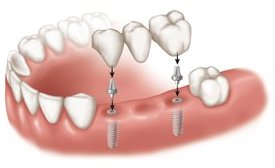
Dental Implant Options
Dental implants can offer an effective way of replacing one or more missing teeth. Dentists recommend that any teeth lost, either due to periodontal disease or due to an accident, have to be replaced in order to avoid damage to jaw bone and further tooth loss. The available treatment options using dental implants are discussed in this article.
In this Article:
What options dental implants offer to help replace missing teeth?
The use of dental implants can provide several options to replace missing teeth and restore the full functionality of the mouth. Treatment options vary depending on the number of missing teeth, the structural integrity of the jaw bone and the specific needs of the dental patient.
Another important factor in selecting one of the available options is the cost of treatment. Dental implants provide a permanent solution to the problem of missing teeth but the cost can not always be covered by a patient. If you look for affordable implants you can choose one of the treatments that provide the best balance between benefits and cost, such as having a 2-implant supported bridge instead of 3 or 4 single dental implants. Of course you can always choose the best option without worrying for the cost if you have dental insurance that covers dental implants.
Single Tooth Missing
 A single tooth implant with crown restoration is the best permanent solution for replacing a single tooth.
It looks and functions just like a natural tooth with many advantages over the only other available option of having a dental bridge.
A single tooth implant with crown restoration is the best permanent solution for replacing a single tooth.
It looks and functions just like a natural tooth with many advantages over the only other available option of having a dental bridge.
Read implant vs bridge for a comparison of the two options.
Multiple Teeth Missing
If there are multiple one tooth gaps in different parts of the mouth, several single tooth implants are needed to replace each of them.

If several consecutive teeth are missing they can be replaced by an implant supported fixed bridge. It looks like a conventional one but it is fixed over tooth implants instead of natural teeth. This option requires fewer implants than the missing teeth thus it combines most of their benefits but with more affordable cost. A combination of single dental implants and implant fixed bridges can be used if there are both one tooth gaps and multiple teeth gaps.
All teeth missing
In case of full jaw or full mouth reconstructions when all teeth need to be replaced, there are two main types of dental implant restoration options:
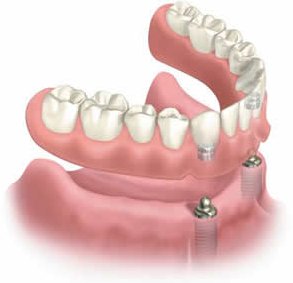
1. Implant Supported Overdentures (Implant Dentures) - are the entry-level option for those who have lost all their teeth, where two or four dental implants are used to anchor and support full or partial dentures. The main benefit is that they provide better stability so that patients do not have to worry that they might slip or fall out. Implant supported dentures are a cost effective way for full mouth restoration and offer the comfort and quality of life that conventional dentures can't provide.
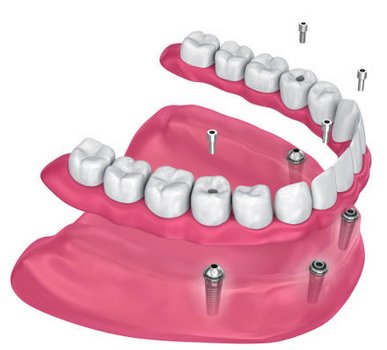
2. Implant Fixed Bridges - this option provides an aesthetic, permanent and stable solution. Typically six to eight tooth implants are needed per jaw to provide adequate support for the bridges, making it a more expensive option compared to implant supported dentures. An implant bridge consists of the crowns based on the dental implants as well as pontic crowns (not supported crowns that are joined together between the anchor crowns to form the fixed bridge).
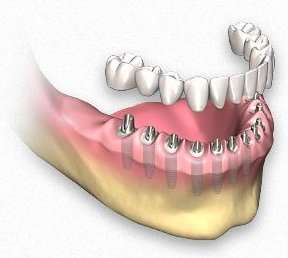
3. Multiple Single Tooth Implants - this is the best option for those who want their new teeth to look and feel like their natural teeth, without the unpleasant feel of plastic in their mouth. But the process requires much more extensive surgery procedures than the other options. Finally the cost of treatment will be much higher ranging from $50,000 to $100,000.
Tooth implants may be used either individually or in combination with crowns, bridges and dentures in replacing single, multiple, full arch or full mouth missing teeth. Each dental patient has different needs, expectations, and budget. Your implant dentist will explain the available options that are suitable for the specific case and explain the advantages and disadvantages of each solution.
Although the cost of dental implants is higher than other alternatives as bridges or dentures, they are the only solution that can provide the closest you can get to the aesthetics, functionality and feeling of your missing natural teeth.
Types of Dental Implants
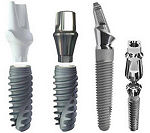
The technology of dental implants has advanced significantly in the recent years, providing solutions for a variety of specific patient needs. A dentist can choose the best option from a wide selection of dental implant types with different shapes, sizes, lengths, materials, coatings etc. The dentist may also select the proper placement method depending on the purpose of the treatment and the condition of the periodontal tissues of the specific patient.
Mini Dental Implants
Mini Dental Implants have a smaller diameter and they are usually used for denture stabilization. In some cases they can also be used as a lower cost alternative of standard implants for replacing front teeth in patients with healthy jaw bone.
Immediate Load Implants
Immediate Load Implants are not only placed in one surgical stage but also the restoration can be placed almost immediately. So, the patient can avoid the long waiting period for the osseointegration process to be completed, but they are not always suitable for all cases.
Teeth-in-an-Hour
Teeth-in-an-Hour™ is an immediate load placement method developed by Nobel Biocare based on sophisticated radiographic techniques combined with computer technology to enable precise surgical placement of the implants.
Denture Implants
Denture Implants are placed in the jaw in order to support or retain a full or partial denture. They can provide a stable denture foundation for patients who have lost all of their natural teeth but have maintained adequate jaw bone mass to support implants.
All-on-4
The All-on-4 (All-On-Four) technique allows the use of implant supported dentures from patients with severe jaw bone loss with the use of only 4 properly placed implants.
next page -> Dental Implant Dentists • How to Choose a Dentist for Implants



